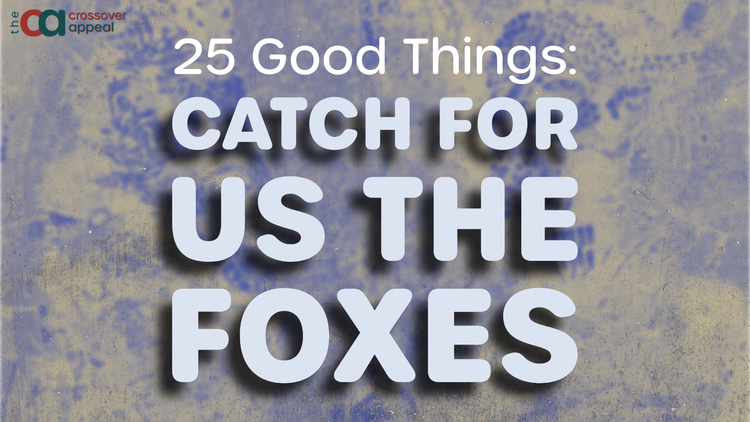I Want To Talk To You About Cruelty

Warning to my subscribers: this isn't a light hearted set of pop culture recommendations per usual. We'll be back to regularly scheduled music, movie, and game recs soon.
17 years ago I enrolled in my first college classes. It was mostly a collection of gen ed courses and a few Bible classes on account of my attending Cedarville University, a conservative Evangelical school near Dayton, Ohio. I hadn’t fully decided on my major yet and, having been home schooled, I had no idea what kind of schoolwork was going to feel good. I ended up enrolling in Composition 101 along with a bunch of other bumbling freshman where I met my future boss, mentor, and friend, Julie Moore.
Julie was the Cedarville Writing Center director and she was good at it. She developed the talent in her student employees with compassion and clarity, helping kids from all backgrounds realize their own potential to be educators and mentors - not to mention writers. When I left Cedarville for a graduate degree in English rather than a career in my major, Psychology, it was in no small part due to Julie’s constant affirmations and her belief in the quality of my work as a budding pedagogue and critic.
Since 2018, a certain phrase has come into common use when people struggle to describe why people in power - politicians, police officers, pastors, presidents - make decisions that benefit no one and only hurt some marginalized group just trying to get through their day.
“The cruelty is the point.”
Adam Serwer coined the phrase writing for The Atlantic as way to get a handle on the tenor of American politics under Trump’s presidency. He looked at the casual hatreds and brazen aggressions which had come to characterize American conservatism in the Trump era and arrived at the conclusion that it’s impossible for this kind of cruelty at this scale to happen accidentally. Moreover, the cruelty isn’t in the service of Machiavellian power brokers orchestrating a grander, ideological scheme. The cruelty itself is the scheme.
Adam’s analysis focuses on the emergence of overt cruelty as a Republican phenomenon in the American political landscape. I’d like you to see Cedarville University as something of an advance guard in the cruelty movement of American Conservatism. A test bed for how cruelty might consolidate power and spit on the compassionate under the happy, watching eyes of Evangelical leadership.
Cruelty needs cover, at least at first. Most people, as a default setting, hate cruelty. This is why Adam Serwer needed to explain that for some people there’s satisfaction in the sadism. Your average Joes, Janes, and Jacks are confused by cruelty on its own; they want an explanation for it.
The structure of the theology at a place like Cedarville - an Evangelical Southern Baptist school with an abiding investment in Moral Majority politics - is extraordinarily effective at producing just such cover. When you gather large communities of people under the shared belief that the stakes are always as high as a baby’s life, a soul’s eternity, and a nation’s fate, cruelties of all shapes and sizes begin to collect in a loathsome menagerie, fostered and sheltered beneath the most righteous of banners.
Julie’s kindness, intelligence, sincerity, and faithfulness to her craft (not to mention to her students) was rewarded at Cedarville with a cleansing. In the few years following my graduation from Cedarville, that menagerie of cruelties reached maturation - the faith leaders of that community began to purge undesirables at scale. Julie’s departure from there was part of a larger exodus of faculty and administrators under duress. Whole departments were shutdown. Women were removed from any position where they might inadvertently teach men about the Bible. Faculty and students alike were forced into brutal non-disclosure agreements in order to preserve Cedarville’s good name.
There are ways to understand Cedarville’s 2010s purge as having been motivated by a commitment to theological purity - but of course, those explanations fail to hold water when you learn that during the same period of persecution, the Cedarville administration knowingly hired and rehabilitated the image of a serial sexual abuser within their faculty. Purity was never at the heart of this project, it seems.
The whole thing was a bitter, cruel affair. It taught me, in a pattern I would see repeated many times over the following decade, that American Evangelicalism simply loves its cruelty. Cruelty is its nearest bedfellow, its bottom line. When Evangelicals lead the outcry about abortion, they do so with mislabeled gore of dead babies outside Planned Parenthoods and in college quads. When they articulate the joy of knowing Jesus, they must also articulate the desperate hopelessness of poor sods outside the faith. And when an orange and white champion tells them to grab their women by the pussy, instead of remembering the good book’s admonishment not to covet thy neighbor’s wife or holding dear their Savior’s example of humility and kindness, they line up at the polls and vote that champion in.
There is a Cedarville diaspora of sorts. Cedarville faculty and students from these years of cleansing are scattered across the country. Most of the faculty I know have maintained a deep and vibrant connection to their faith and the work of understanding it, despite the hideous rejections they experienced.
Julie, for her part, landed at Taylor University, another Chistian liberal arts school in the rural midwest. She’s a poet as well as a faithful Christian, and when I heard about her move to Taylor years ago, I hoped that Taylor’s more moderate reputation would provide her the support and the shelter she needed for her work to flourish.
But then came the telltale signs. A controversy spearheaded by conservative faculty against the student-run newspaper. The invitation and endorsement of Mike Pence in 2019 against which a small but vocal group of students protested. A familiar menagerie was began to assemble beneath a familiar banner.
Last weekend Julie reached out to me and my wife to let us know that she was losing her job - again. The specific reason given to her this time was that she taught material by Jemar Tisby, author of the Color of Compromise, a book about American Christianity’s role in upholding racism. Julie is a consummate professional and a passionate educator, decades into a long career littered with dozens if not hundreds of people like me who stand as testament to what compassion mingled with rigor can accomplish. At Taylor she once again dared to suggest that perhaps American Evangelicalism has played a role in sustaining some of our culture’s cruelest habits - and for that the faith leaders of this Christian center of learning have tried to silence her again.
Because that’s the other thing about cruelty. Nobody is supposed to like it. And when you name a thing as cruel, and when the name seems to fit as true as it does in this case, well, power has to stop the naming from happening. Otherwise its cover is blown.
The amazing thing about Trump and post-Trump conservatism is it no longer wants cover for its cruelty. No one seriously tries anymore to justify the casual hatreds of Trump, DeSantis, and Cruz as an expression of tactics or ideological commitments. Their cruelty and the cruelty of their politics are naked for all to see and that has become its appeal.
But for places like Taylor, they still need the cover of righteousness. Their funding and enrollment still depends on the fiction that their cruelties spring from good faith engagement with Christian tradition; the high stakes of unborn lives and eternal damnation, the uprightness of old white men behind the pulpit.
But as Julie picks up the pieces for a second time, I want to say that once again the cruelty was the point. It’s essential to places like Taylor that they maintain the right to exercise the kind of cruelty that throws a dedicated professor and educator in the latter stages of her career out into a volatile job market because she has the nerve to suggest its tradition is not squeaky clean. Julie’s firing has the same meaning as all the book bannings, the anti-trans legislations, the authorization of power against women and what they do with their bodies, the lies about immigrants and Black folks told in cities across America, and the constant crises of faith and power in American churches when abusive men are allowed to maintain their stations.
It all means this: the extent of your righteousness is best understood by the impunity of your cruelty.
One of the first things I wrote in college was a two page personal essay about my relationship to Redwall, a series of children’s books about heroic mice, villainous rats, and the beautiful, intoxicating power of belonging. I wrote this piece in response to an assignment Julie gave me in that freshman composition class. I didn’t write much in high school, at least, not much that got assessed in an academic way. It was a nerve-wracking thing to submit. I was 17 years old, slamming words next to each other and trusting to hope that they conveyed something my professor would connect to.
And connect she did. She gave me thorough, enthusiastic feedback on how to improve. But what really rocked my world was that she asked me if I would consider becoming a writing center tutor. She said she wanted to use my piece as an example for future classes and she wondered if I’d be interested in working alongside her, helping future students come into their own voices on paper.
The stories circulating right now about Julie Moore’s departure from Taylor are important, clarifying, and essential to understanding the shape of American cruelty in the 21st century. I hope what I’ve written here can contribute to that circulation.
But these are the details I really want you to know about Julie. Know that in firing her, Taylor has decided against faithfulness, compassion, attentiveness, concision, passion, critical thinking, empowerment, and deep engagement with the world we all must live in. Know that Julie is not just a beleaguered professional caught for too long in the empty horror show of Evangelicalism’s culture war.
Julie is the first person in your life who paid attention to you - really stopped to pay attention to you. And it changed you. It made you better.
And the cruelest thing is that places like Taylor and Cedarville don’t believe you’re worth that attention.
Further reading:
Taylor professor Julie Moore cited Jemar Tisby on her syllabus. Then she lost her job.





Member discussion